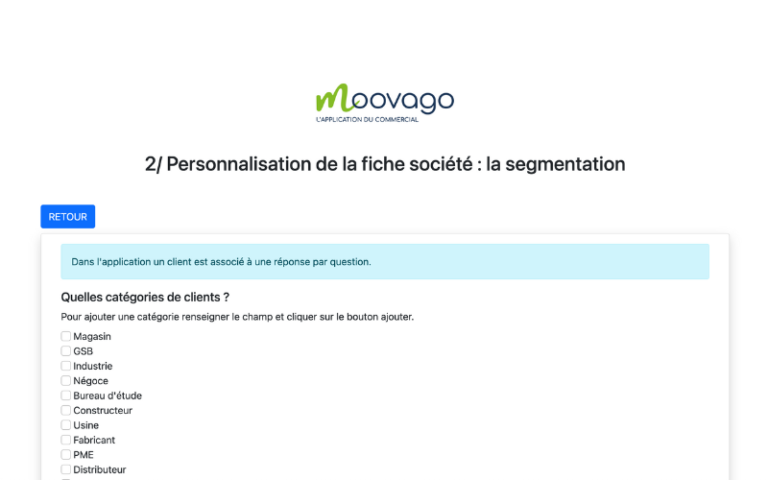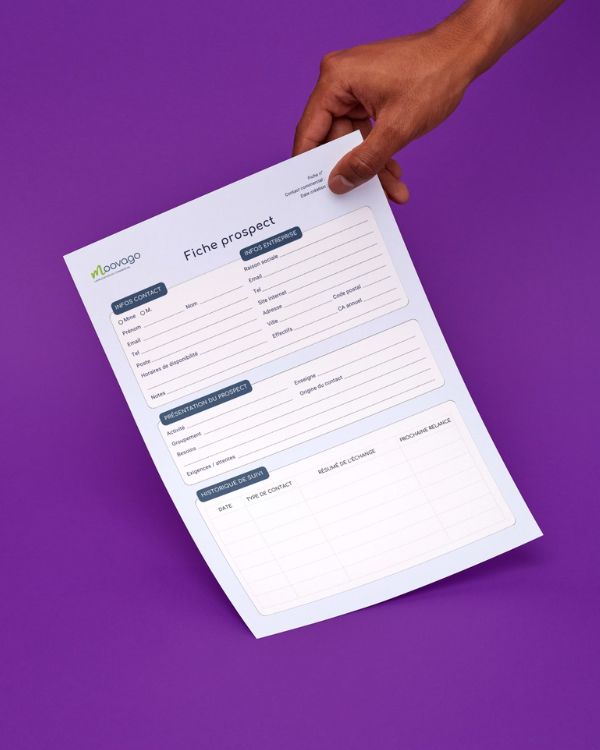B2B prospecting is essential for the development of companies and the business of independent sales representatives. The aim? Generate new leads and increase sales.
In this article, we’ll take a look at the definition of B-to-B prospecting, what’s at stake and the different techniques available for successful prospecting.
The definition of B-to-B prospecting
B to B is an acronym for “Business to Business”. It can also be written as b2b or B2B.
B-to-B prospecting is the action of seeking out potential potential customers among companies. More broadly, it refers to all the techniques used to identify, contact and convince companies to become customers.
These techniques can take a variety of forms, including teleprospecting, cold emailing and social networking.
What's the difference between B-to-B and B-to-C prospecting?
Unlike B-to-C prospecting, which involves reaching end customers, B-to-B prospecting is aimed at professionals. It requires a more strategic and professional approach.
Some prospecting tools are suitable for both targets, but B-to-C prospecting sometimes requires specific arguments, resources and tools to be effective.
Find out more: What are B2B and B2C? Definition, examples, differences

The challenges of B-to-B prospecting for VSEs
B-to-B sales prospecting is a crucial issue for all companies targeting this target group. The main objective is to develop their business and increase their sales. The challenges are many: generating quality leads, building a solid sales pitch, finding the right tricks to convince prospects and facilitating the sale by using good sales practices.
In general, business prospects are more complicated to win than private individuals. However, they remain in contact with the companies they like to work with for longer. That’s why customer satisfaction is so important.
Both parties will want toinvest in a long-term relationship. Indeed, prospects are interested in the solidity of the business relationship, customer service and the overall quality of service and products.
Step-by-step techniques for successful B-to-B prospecting
There are many different techniques for b-to-b prospecting, and it’s important to find the ones best suited to your business. To get off to a good start, we advise you to draw up a b to b prospecting plan.
Create a b-to-b prospect database
The first step to successful b-to-b sales prospecting is to find and save your potential customers’ data. Ideally, you shoulduse a prospecting tool or CRM to gather all your prospects’ information in a database.
Moovago lets you manage your contacts efficiently, and find all the companies, contacts and histories relating to your business in our application. You’ll be able to :
- Import data into the Moovago database (personal and secure information),
- Create contacts and companies,
- Feed your database (labels, segmentation, etc.),
- Structuring your database.
Of course, the construction of this database must comply with RGPD rules, to avoid any risk of sanctions.
Are you a traveling salesperson? Then having your

Target customer segmentation
To prepare your B-to-B prospecting plan, determine your target market and segment your prospects into broad categories. This segmentation will enable you to better understand your prospects’ needs and expectations, and adapt your arguments accordingly.
Start with your database of existing customers, because the criteria for sorting these customers are perfectly transposable to the search for new prospects. For example, if most of your existing customers are small businesses in a specific industry, it makes sense to focus on finding similar prospects.
If you don’t yet have a clear segmentation, or if you’re just starting out,with Moovago it only takes a few minutes to segment companies by answering 10 questions. However, if you wish to refine the segmentation of your b-to-b contacts, you can add new segmentation criteria at any time.
Labels can be used to sort companies into 2 categories: hot and cold prospects, for example.
Find out more: Segmentation with Moovago: principle, functions & examples

Drawing up a prospecting guide
Now you know who to call and how to keep an eye on your interactions with your prospects. But how do you convince them to buy your products or services?
Draw up a prospecting guide to define the different steps to follow when prospecting. This guide will enable you to put in place a clear and effective strategy for achieving your sales objectives.
More concretely, this guide will contain a solid argument to effectively convince your prospects. If you’re a sales representative, your principals may be able to provide you with this tool. If you’re a company, it’s advisable to take training courses or call in marketing experts to help you develop effective strategies tailored to your business.
In addition to sales pitches, the prospecting guide can dictate good sales practices, i.e. the sales techniques to be applied on the telephone or in sales meetings. Particularly relevant if you’re part of a sales team or agency, and want to convey a uniform corporate image.
Use the right tools for B-to-B prospecting
To organize your B-to-B prospecting plan effectively, it’s best to use the right tools. These tools will enable you to monitor your sales force’s actions and measure the results of your prospecting campaign.
Here are some of the salesperson’s best tools:
- A smartphone for successful b-to-b telephone prospecting: also known as telemarketing, phoning or calling. Your prospecting guide can include an effective script for responding to the various objections expressed by your prospects over the phone, and maximizing your chances of closing a sale.
- b to b prospecting email templates: a more modern technique for contacting prospects and building loyalty through emaiL Emailing, however, is more akin to marketing than sales.
- Scraping software: to collect large-scale data on prospects. This data is then used to build mailing lists, email campaigns or prospect files. Beware, however, as this practice falls outside the RGPD recommendations on personal data.
- Sales follow-up software or CRM: indispensable for B-to-B prospecting. They enable you to track prospects throughout the sales process and optimize each stage of the process. These programs, like Moovago, can help you, as a salaried sales representative or sales agent, to organize your prospecting activities, schedule telephone calls, and draw up plans to reach your sales targets.
- Prospecting software: such as Pipedrive or SalesForce.
Not ready to switch to CRM yet?
See also our printable prospect sheet
Our BtoB prospect sheet lets you collect and organize important information about your contacts.
Easily track your exchanges and next actions.

